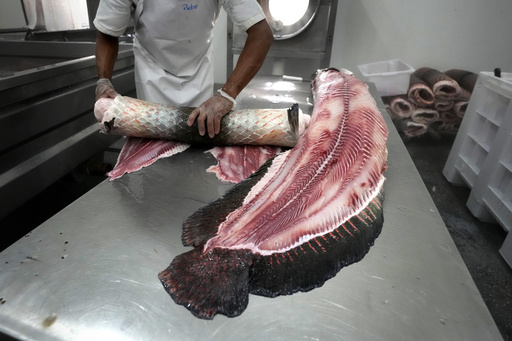
BRASILANDIA, Brazil — The impending closure of the U.S. Agency for International Development (USAID) poses a significant threat to various initiatives in South America, including humanitarian aid in Colombia, environmental preservation in the Brazilian Amazon, and coca elimination efforts in Peru. These countries have historically benefited from American support, which is now in jeopardy.
Even if some funding resumes following the 90-day halt mandated by President Trump, many projects that USAID has financially supported could be endangered. These projects are often centered around topics that the president has criticized, such as climate change, biodiversity, and the rights of minorities and women. As a result, organizations relying on this aid fear their initiatives may be effectively terminated.
Colombia has consistently been the top recipient of U.S. foreign aid in South America. Recent allocations of USAID funds have assisted over 2.8 million Venezuelans who fled their home country due to economic crises, with $45 million being funneled to the U.N. World Food Programme just for 2024. The cessation of U.S. humanitarian assistance in Colombia and Brazil further compounds challenges faced by Venezuelans in the region. Recently, the Trump administration also ended temporary immigration protections for around 600,000 Venezuelan nationals, with deportations expected to begin in the coming months.
According to Bram Ebus, an International Crisis Group consultant in Bogota, the cuts will particularly impact vulnerable sectors of Latin America, including migrants and refugees. Grassroots organizations that offer essential services could face funding shortages, which may embolden organized crime to exploit these communities.
President Gustavo Petro of Colombia has criticized some forms of U.S. aid as unwelcome, asserting that U.S. funding of border enforcement officers is harmful. He stated during a cabinet meeting that aid from USAID should not cover local salaries, highlighting a complex relationship with American assistance. For the fiscal year 2024, USAID earmarked nearly $385 million for Colombia.
Trump expressed his belief that dismantling USAID was overdue, and Elon Musk, instrumental in recent government reductions, labeled the agency as “a criminal organization.” In Brazil, USAID’s flagship program is the Partnership for the Conservation of Amazon Biodiversity, which aims to enhance livelihoods while preserving the region’s ecology. This initiative holds special significance as Brazil encompasses two-thirds of the Amazon rainforest—home to vital ecosystems.
One important recipient of USAID support is the Roraima Indigenous Council, which oversees a vast area including that of the Yanomami tribe. With the funds, they have worked on enhancing family farming, implementing climate change adaptations, and increasing income for women. However, Edinho Macuxi, the council’s leader, expressed deep concern about potential funding cuts undermining crucial initiatives aimed at supporting Indigenous communities. This partnership has been in effect for seven years, and any termination would severely disrupt their ongoing programs.
Macuxi emphasized that maintaining U.S. funding is essential not only for Brazil but for other affected countries as well, stating that Indigenous groups play a pivotal role in safeguarding the rainforest, which serves as a crucial resource for the planet. In the past few years, USAID has also played a vital role in sustainable practices in the Amazon, such as managed fishing of the pirarucu, a native fish species, providing both livelihoods and revitalization of ecological balance. For 2024, USAID allocated $22.6 million to Brazil, with a substantial portion directed towards environmental protection, particularly concerning the Amazon rainforest.
In Peru, USAID’s funding reached approximately $135 million in 2024, including efforts aimed at curbing cocaine production by promoting alternative crops like coffee and cacao. These initiatives date back to the early 1980s, as Peru is the second-largest cocaine producer globally, following Colombia. Premier Gustavo Adrianzén indicated that the government would persist with crop substitution efforts independently of U.S. funding.
Former DEVIDA chief Ricardo Soberón expressed that the suspension of USAID’s support could present an opportunity to re-evaluate an historically ineffective partnership. He noted that while the assistance had always been tied to certain political conditions, neighboring Bolivia, which expelled USAID in 2013, has reported better outcomes in managing cocaine production since that time. He stated that Bolivia’s autonomy has led to more effective social control policies despite the nation’s challenges.

